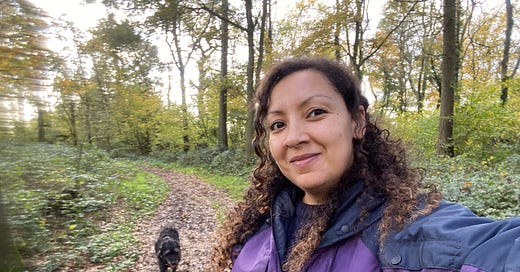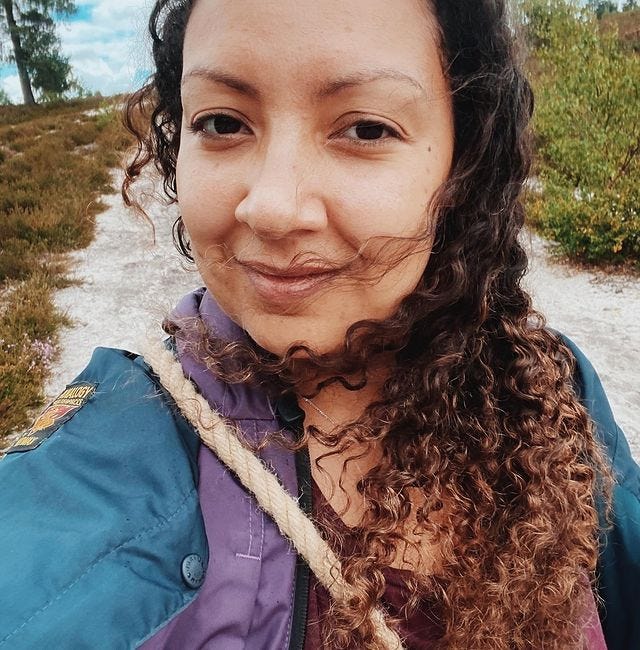Soraya Abdel-Hadi: “People think I’m exotic - I’m from Hampshire”
The founder on language, privilege and the gift of code-switching
Hi, welcome back to Mixed Messages! This week I’m speaking to Soraya Abdel-Hadi, founder of All The Elements, a non-profit network for communities diversifying the outdoors. Soraya is of mixed-Sudanese and white British heritage, and has used her mixed identity to influence her work. Read her story below.
How do you define your ethnicity?
I’ve always referred to myself as mixed race. My dad is Black African, from Sudan, and my mum is white British. I’ve always been comfortable in my mixedness. I’ve never identified more strongly with one side than the other. Sometimes, I just couldn't work out where I sat on the spectrum.
A little while ago a white male friend said that I couldn’t call myself mixed-race, that it was biracial now. I was like, “sorry, I didn’t get the memo!” I thought that was funny.
Did you feel connected to your Sudanese heritage?
I’ve never really had a deep immersive experience of my culture. I grew up in a predominantly white area and I felt very disconnected, because most of my dad’s family live abroad. I was in touch with them, but I didn’t feel ethnic enough. People would look at me and expect a certain thing, but I didn’t have that background and experience, which is why I probably wouldn’t refer to myself as Black.
What was it people were expecting from you?
Speaking a different language, which was really tricky for me. I’ve tried to learn Arabic, my dad’s first language, over the years, but I’m terrible at it. I have nobody to practice with. I’ve always wanted to learn and did a GCSE in Arabic, but you learn the Prince’s Arabic and only basic things like “there’s a large table in my living room.” My cousins speak dialect and I have no idea what they’re saying.
Tell me about All The Elements – how does your mixedness influence your career?
For a very long time, I advocated for women and worked in the outdoor sector. I shied away from diversity work, but saw that a lot of the communities I was in, like conservation, nature and horse riding were predominantly white. People in those spaces would ask me about diversity, but I didn’t feel like I was the right person to talk about it – I’m privileged, and probably went to the same schools as the people asking me about diversity. People think I’m exotic - I’m from Hampshire. I felt like a fraud.
I started to read up on the history of people of colour in the UK and the experiences of other marginalised identities, and I got better at answering questions to do with barriers to the outdoors and sustainability. It felt exhausting and lonely, and I thought that other people must feel like this. I wanted to build a network for individuals and groups who want to create change and diversify the UK outdoors, helping with leader development support, connecting people with similar interests and advice on what type of company to register as. I wanted a space that encompassed all diversity areas and characters - we are whole people, and one thing is not our defining characteristic.
You mentioned mixed people are overrepresented in your work - why do you think that is?
I’ve never spoken to so many mixed-race people in my entire life! I wonder if it’s a proximity to whiteness or mixed people being more palatable, even if it’s not why we’re running the organisation, is it why we’re getting recognition? Then I thought, is it because if you’re mixed with White British, that’s where the outdoorsy side of your family sits? My mum and grandparents are a really important part of me being immersed in the outdoors, although that’s obviously not true for everyone.
Also, for many people who moved to the UK, while they may have come from rural communities, they may have moved to urban environments, facing hard barriers to the outdoors, like access to transport and green spaces, or soft barriers like not knowing if you’d be welcome in a space or what to do when you get there.
How do you want the mixed conversation to shift in future?
I think it’s important to have spaces for everyone, but it’s important to be clear. I don’t think all spaces need to accept mixed people - I wouldn’t expect a Black women’s group to accept me, because I don’t identify as Black. That needs to be communicated to both the mixed person and the group. People don’t understand what it’s like to be mixed-race and spend your whole life wondering if you’re part of a group or not.
What’s the best thing about being mixed?
Being able to operate in a lot of spaces. People talk about the emotional labour of code-switching, but I think it’s a gift. Yes, I don’t necessarily fit fully into any spaces, but generally speaking, I’m not going to be immediately excluded. I think it can go both ways, depending on your personal experience.
I love being mixed-race, I would never choose to be anything else.
Can you define your mixed identity in a word?
Multiplicity.
Next week, I’ll be talking to TikTok creator Mina Moriarty, aka @historyho101. Subscribe to get Mixed Messages in your inbox on Monday.
Enjoy Mixed Messages? Support me on Ko-Fi! Your donations, which can start from £3, help me pay for the transcription software needed to keep this newsletter weekly, as well as special treats for subscribers.
Mixed Messages is a weekly exploration of the mixed-race experience, from me, Isabella Silvers. My mom is Punjabi (by way of East Africa) and my dad is white British, but finding my place between these two cultures hasn’t always been easy. That’s why I started Mixed Messages, where each week I’ll speak to a prominent mixed voice to delve into what it really feels like to be mixed.







In Jamaica, Mixed race peoples are called Brown. The women affectionately are called Browning, that's regardless of mixture which is different from admixture which is a small amount of mix abt 25% and less( Griffe) ;Mulato is also used, especially in Latin America. Creole is used in Belieze.